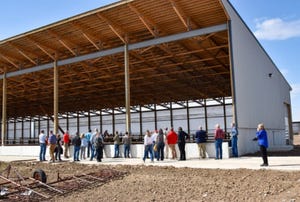Cow Care During The Last Trimester Of Pregnancy
Winter is really challenging to cow-calf operations.
February 14, 2011

Winter is really challenging to cow-calf operations. The cold wind and snow put stress on gestating cows. Many of the cows we inspect at the auction market show weight loss, resulting in poor body condition. It is very important not to cut any corners with your breeding herd.
Nutrition during the last trimester of gestation is very important. This is the time when the calf grows very rapidly. If the cow is not receiving adequate nutrition, the calf may be weak at birth or under weight. The cow is also formulating colostrum from circulating antibodies. If the cow is missing adequate nutrients, the quality of colostrum will be compromised and the calf will not gain adequate immunity after birth. In some cases, cows may be so weak that they are unable to properly deliver the calf.
Louse populations increase during cold weather. Many cows we are pregnancy-checking at auction are showing areas of louse infestation. We are also seeing resistance developing to many of the commonly used pour-ons. It may be a good idea to repour the cowherd to minimize any louse populations which may have evaded primary treatment.
Internal parasites also compete with the cow for nutrition. If animals have not been dewormed, it may be cost-effective to administer a dewormer. Most familiar are the injectable and drench products, but product is also available in the form of blocks, mineral additives and bagged pelleted products which can be added to the cow's feed.
To read the entire article, link here.
You May Also Like

.png?width=300&auto=webp&quality=80&disable=upscale)
.png?width=300&auto=webp&quality=80&disable=upscale)
